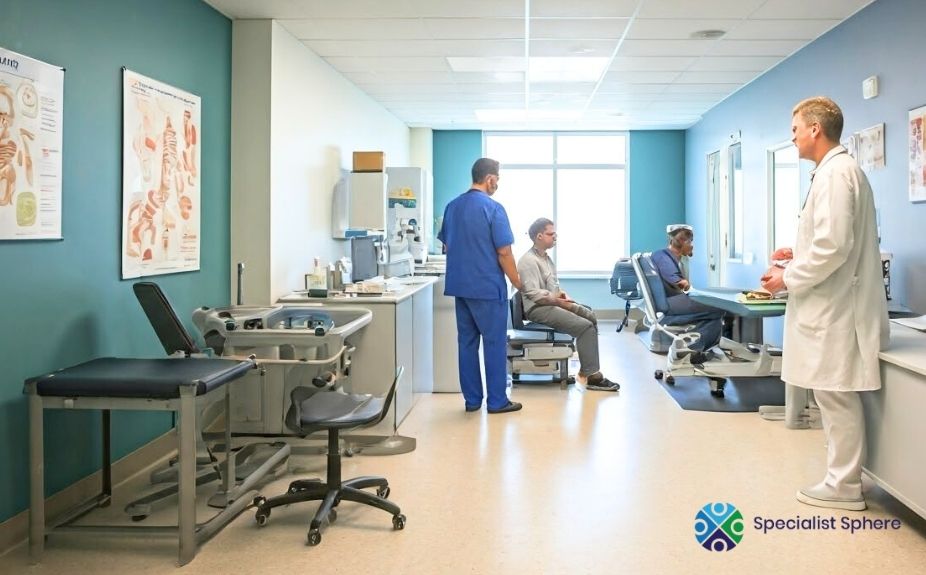Key Highlights
- Finding the right orthopedic doctor is crucial for your bone health.
- Consider factors like experience, specialization, and patient reviews.
- Understand the importance of timely consultation for musculoskeletal issues.
- Learn about common orthopedic conditions and available treatment options.
- Prepare for your consultation with relevant medical history and questions.
Navigating orthopaedic care can seem tough, especially when you want the best treatment for your bones and joints. In this guide, we will look at how to find a good orthopaedic specialist in Singapore. This person can give you great patient care. We will help you understand your condition and make smart choices about your treatment. Our goal is to give you the knowledge you need to start your recovery with confidence.
Understanding Orthopedic Care in Singapore

Orthopedic care in Singapore is well respected worldwide. There are many talented orthopedic surgeons and specialists here. They deal with many different issues related to muscles and bones. The country uses advanced medical technology and facilities. This helps ensure that patients can access the latest treatment options.
Singapore’s healthcare system focuses on patient care. It stresses careful diagnosis and tailored treatment plans. It also has effective rehabilitation programs. These programs help people regain mobility and enhance their quality of life.
The Role of an Orthopedic Doctor
An orthopaedic doctor is a medical expert focused on finding, treating, and preventing problems with the musculoskeletal system. This system includes your bones, joints, ligaments, tendons, muscles, and nerves. These parts are important for movement, mobility, and daily tasks.
Orthopaedic doctors use many treatment options that include both surgical and non-surgical methods. If you feel ongoing pain, have limited mobility, or believe you have a musculoskeletal issue, getting quick medical attention from an orthopaedic surgeon is very important. This helps in getting the right diagnosis, effective treatment, and lasting relief.
Why Timely Consultation is Crucial for Bone Health
When you have orthopaedic conditions, it is very important to see a doctor early. Getting timely medical attention can help avoid further problems and lead to better results. If you ignore ongoing pain or discomfort, it may turn into chronic pain, limit your mobility, and make your recovery take longer.
Going to a doctor right away helps them identify the main issue correctly. This allows specialists to create a treatment plan just for you. By dealing with bone and joint problems early, you can often use less invasive methods, like physical therapy, medications, or injections for care.
Seeing a doctor quickly gives you the ability to manage your bone health. It can lower possible risks and greatly improve your chances for a successful recovery.
How to Find the Right Orthopedic Specialist
Choosing the right orthopaedic specialist is important for your healthcare journey. With many options out there, it is vital to find a doctor who understands your needs and gives you personalized care.
So, how do you go about this? Think about a few key things when making your choice: experience, areas of expertise, and what other patients say. By looking at these factors, you can confidently pick an orthopaedic specialist who matches your healthcare goals.
Factors to Consider When Choosing an Orthopedic Doctor
Specialization and Expertise: Orthopedics covers many areas. Some doctors focus on specific topics, like sports injuries, joint replacement, or treating kids. Think about your needs and find a doctor who is skilled in the area that matters most to you.
Years of Experience: An orthopedic doctor with many years of experience usually has a better understanding of difficult cases and how to treat them. Look for a doctor who has helped many patients successfully.
Fellowship Training: Fellowship programs give extra training after residency. A doctor who has gone through a fellowship shows that they are serious about their field and have advanced knowledge. You should check the profiles of our orthopaedic specialists for more details.
Seeking Recommendations and Reading Reviews
Personal recommendations from your primary care physician, family, or friends who have had similar treatments can be very helpful. They can share their thoughts about the doctor’s methods, bedside manner, and overall experience as a patient.
Besides personal recommendations, online reviews and testimonials can give useful information about other patients’ experiences with a specific orthopedic doctor. Websites dedicated to healthcare reviews can highlight different aspects, such as:
- Communication and Bedside Manner: How well does the doctor explain diagnoses and treatment options?
- Staff Friendliness and Efficiency: Are the clinic staff friendly and quick to help patients?
- Overall Experience: Do patients feel respected and heard during their visits?
For example, Dr. Kannan Kaliyaperumal and Dr. Ganesan Naidu are well-respected orthopaedic specialists within the IHH Healthcare network.
Common Orthopedic Conditions Treated
Orthopedic specialists focus on many issues that affect the musculoskeletal system. These issues can come from injuries in sports, long-term diseases, or damage that happens as we age.
They treat things like fractures and ligament tears. They also help with arthritis and perform joint replacements. These doctors are trained to find and treat a variety of problems with our musculoskeletal system.
Sports Injuries and Their Management
Sports injuries, like sprains, strains, fractures, and dislocations, are common for athletes and active people. Specialists in sports medicine work to diagnose, treat, and stop these injuries. They aim to help individuals get back to their best performance.
Treating sports injuries usually involves several methods. These methods are combined based on the specific injury and the person’s needs. Some options include:
- Physical therapy: This includes exercises to rebuild strength, flexibility, and range of motion.
- Medications: Pain relievers, anti-inflammatory drugs, or injections can help manage pain and swelling.
- Surgery: Sometimes, surgery is needed to fix damaged tissue or stabilize joints.
A strong rehabilitation team, which often includes physiotherapists, athletic trainers, and other healthcare experts, works together. They support patients through every step of recovery. Their goal is to help individuals safely return to their desired activity level.
Degenerative Bone Diseases: What You Need to Know
Degenerative bone diseases, like arthritis, osteoporosis, and spinal stenosis, are common as we age. They can make life more difficult.
Arthritis leads to joint swelling, pain, stiffness, and less mobility.
Osteoporosis makes bones weaker. This increases the chance of fractures, especially in the hip, spine, and wrist.
Spinal stenosis means the spinal canal gets narrower. This can cause back pain, leg pain, or numbness.
Finding these problems early is very important for managing them well. Treatment options can include medications, physical therapy, some changes in lifestyle, and sometimes surgery. For example, a hip fracture, which often happens with osteoporosis, may need surgery. After that, a full rehabilitation program is usually needed.
Preparing for Your Orthopedic Consultation
Getting ready for your orthopedic consultation can help you make the most of your time with the doctor. It can also make your appointment more helpful.
To get prepared, gather important documents, write down your symptoms, and create a list of questions. This way, you will be set to talk about your concerns honestly. You will also understand your diagnosis better and make smart choices about your treatment plan.
What Documents to Bring
Bringing the right documents to your orthopedic consultation helps the doctor understand your medical history better.
Here’s a checklist of documents to think about bringing:
- Medical History: Write down details about your current symptoms, past orthopedic injuries or surgeries, and any ongoing medical conditions.
- Imaging Studies: If you have any past X-rays, MRI scans, or CT scans related to your current issue, please bring them or ask for them to be sent to the doctor’s office ahead of time.
- Medication List: Make a complete list of all the medications you are taking. This should include prescription drugs, over-the-counter medications, and any herbal supplements.
Questions to Ask Your Orthopedic Doctor
During your consultation, it’s completely okay to ask questions about your condition and treatment options. If you have any doubts or are unsure about something, feel free to ask.
Here are some questions you might think about:
- What are my treatment options?
- What are the risks and benefits of each option?
- Is surgery necessary, or are there non-surgical options?
- What is the expected recovery time for each treatment option?
For instance, if you are thinking about knee surgery, you can ask about the different types of surgical methods, like arthroscopy or total knee replacement. It’s important to find out which option suits your needs and lifestyle the best.
Conclusion
Finding a good orthopedic doctor near you is important for bone health. Whether it’s for sports injuries or bone issues that get worse over time, getting help on time is essential for effective treatment. Look at recommendations and reviews when choosing the right doctor. Keep in mind, not every orthopedic problem needs surgery. Regular visits can help prevent serious issues later on. Take charge of your bone health by getting expert help and treatment quickly. If you want personalized care, schedule a consultation with our skilled orthopedic team today. We are here to offer support and guidance.
Frequently Asked Questions
How Often Should I Visit an Orthopedic Doctor?
The number of visits you need depends on how serious your condition is and if it needs regular monitoring. If you feel sudden pain, have instability, or notice a big drop in your mobility, you should get medical attention from an orthopedic specialist quickly. Your primary care physician can help you decide if you need a referral.
Can Orthopedic Issues Heal on Their Own?
Some orthopaedic conditions can improve with simple treatments like rest, ice, and over-the-counter pain relievers. However, more serious issues usually need help from a professional. If you ignore ongoing pain or discomfort, it can turn into chronic pain and cause more problems. This may require a larger treatment plan that could involve minimally invasive surgery.
What Are the Signs I Need to See an Orthopedic Specialist?
If you feel ongoing pain, stiffness, or swelling in your joints, bones, or muscles, it’s important to talk to an orthopaedic specialist. Other signs to look for are limited mobility, trouble doing daily tasks, back pain, or issues such as gout, bunions, and plantar fasciitis.
How Do I Prepare for My First Orthopedic Appointment?
Collect all important medical records. This should include past X-rays, MRIs, or CT scans. Also, write down your symptoms, medications, and any questions you have for the orthopaedic doctor.
If you are looking for help with ankle surgery or total knee replacement surgery, having these records ready can make your visit easier.
Is Surgery Always Necessary for Orthopedic Conditions?
Not all orthopedic problems need surgery. Many times, physical therapy, medications, and lifestyle changes can help solve the issue without an operation. If these methods do not work, the orthopedic surgeon might suggest minimally invasive surgery or other types of surgery as part of your treatment plan.


